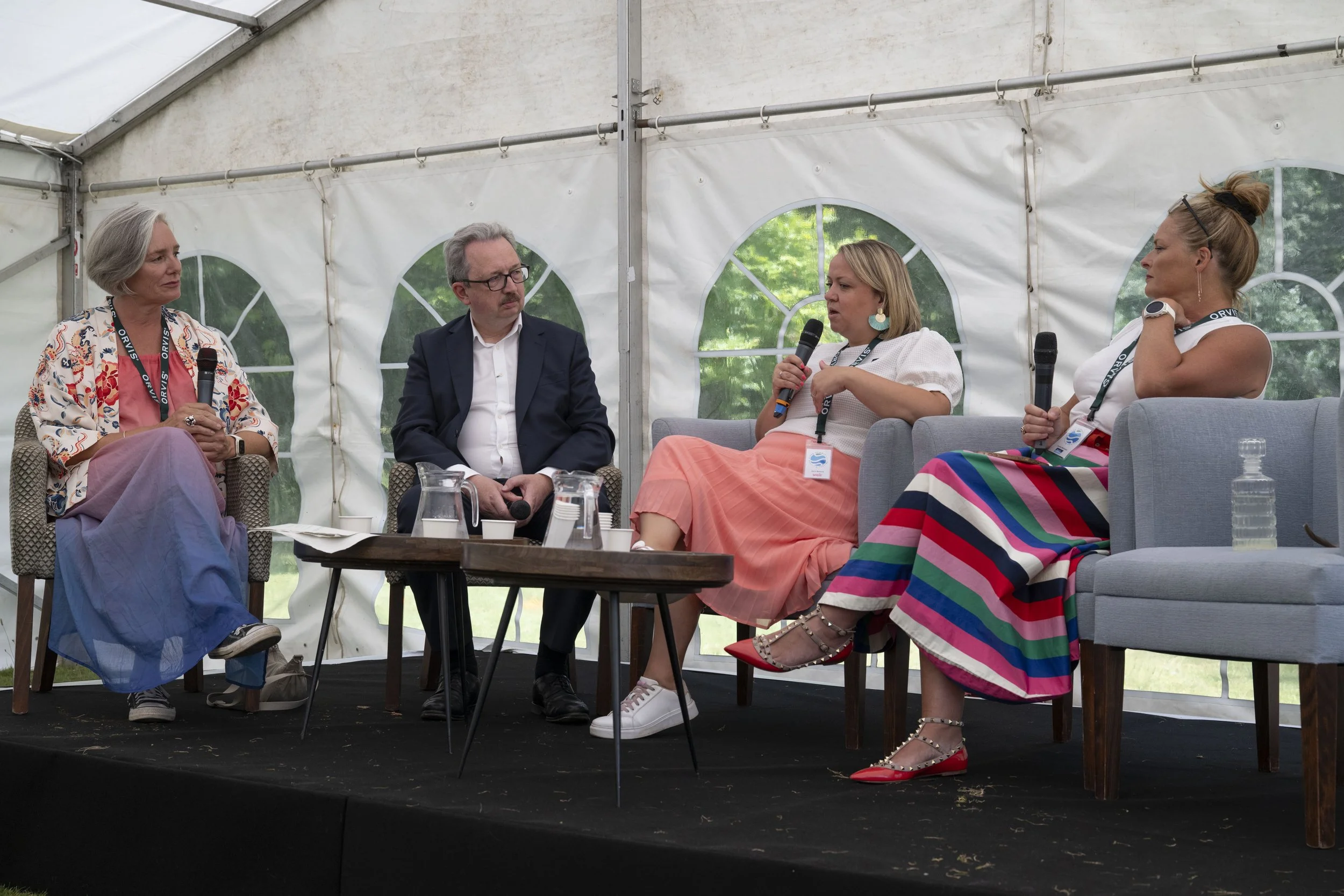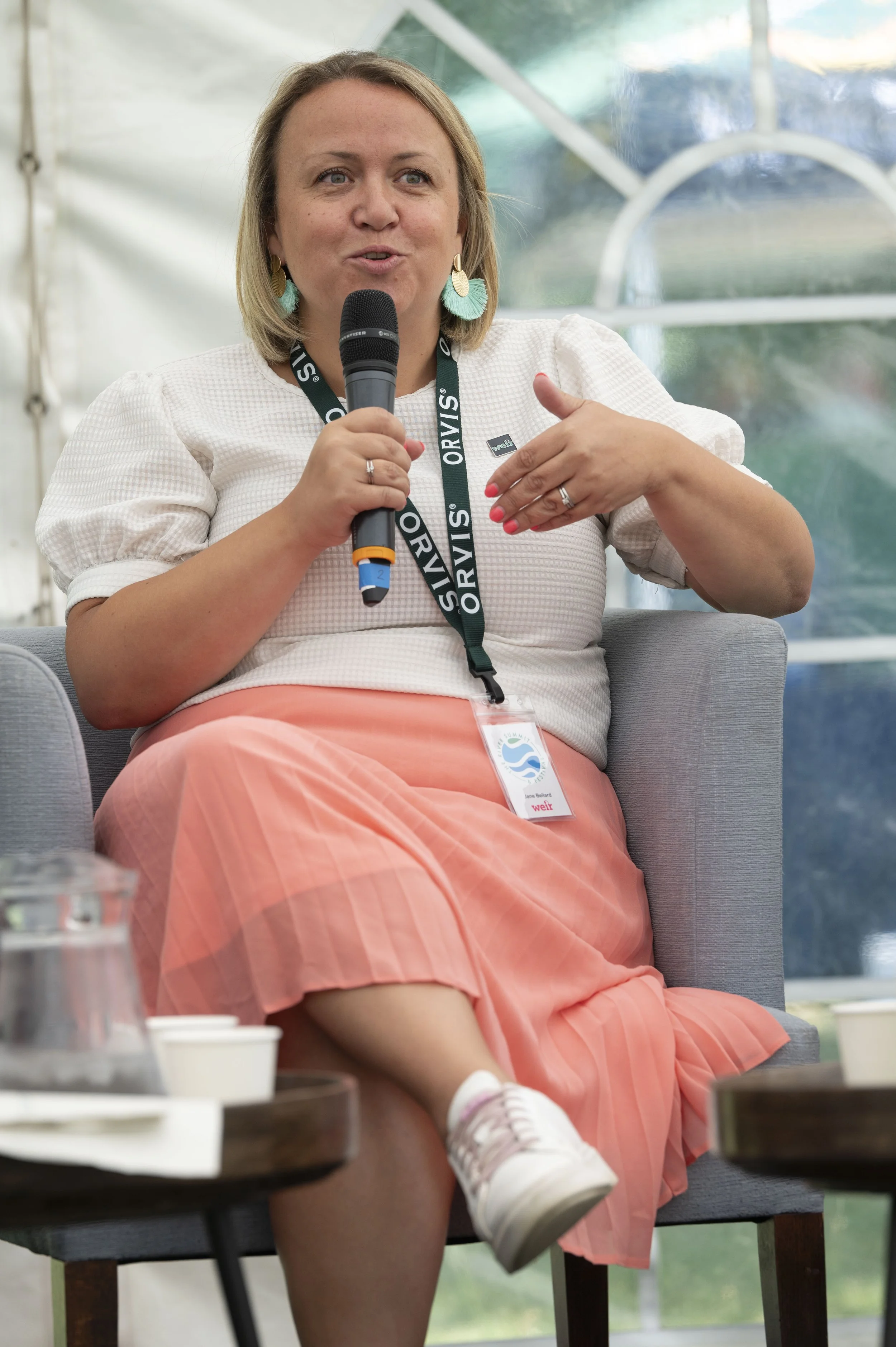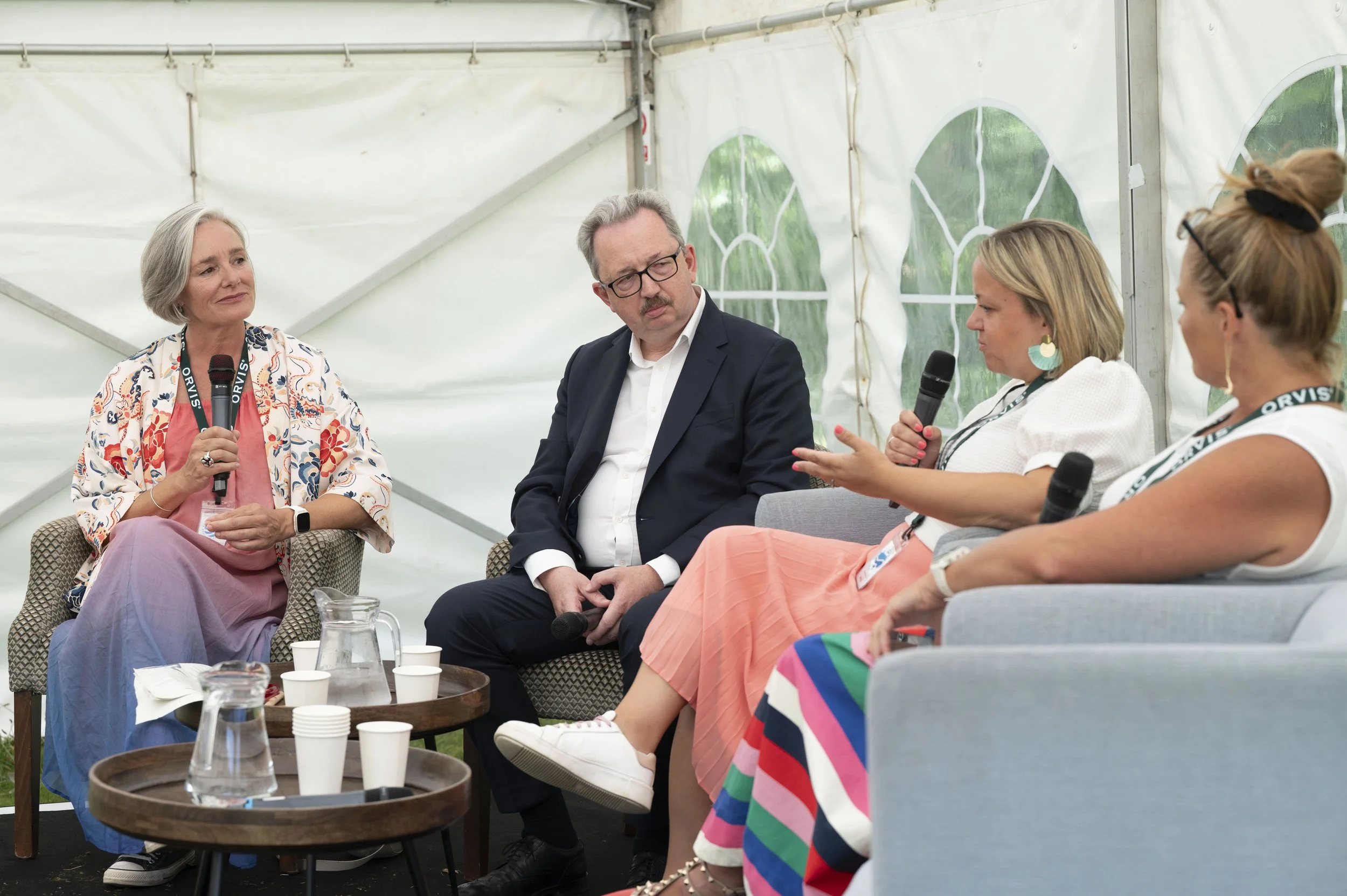Changing Hearts and Minds: The Human Behaviour Challenge at the UK River Summit
The Human Behaviour Panel
The elephant in the room at this year's UK River Summit wasn't just water scarcity – it was the fundamental question of how we change human behaviour to address it. As we work to clean up our rivers, we're rapidly approaching a future where water scarcity will demand unprecedented shifts in how we all think about and use water.
Claire Zambuni, founder of the UK River Summit, chose to chair this panel personally – reflecting her deep conviction that behavioural change sits at the heart of our environmental challenges. "It's a personal interest of mine," she explained in opening the session, "because it's the elephant in the room. At some stage we are going into water scarcity and we're all going to have to take responsibility for that and how we deal with that and how we change our behaviours."
Our Human Behaviour Panel on July 8th brought together three distinct yet complementary perspectives on this challenge: regulatory leadership, campaign expertise, and grassroots activism. The conversation revealed both the scale of the opportunity and the complexity of driving meaningful change.
A National Campaign Takes Shape
Mark Wiltsher from Ofwat opened with sobering statistics: by 2050, England could face a five billion litre daily water deficit – roughly a third of our current usage. His solution? The first-ever national water efficiency campaign, backed by £75 million over five years and launching with a tender process this summer.
"We have a once-in-a-generation opportunity to change the way we value water," Wiltsher explained, drawing parallels to successful behavioural change campaigns like drink-driving awareness, which has seen convictions fall by 85% since 1980.
The campaign will operate through an independent delivery body – think "Drink Aware" for water – designed to build trust beyond the water companies themselves. With smart meters being rolled out to 10 million homes and additional innovation funding of £400 million, this represents the most comprehensive approach to water efficiency the UK has ever seen.
The Marketing Challenge
Jane Bellard from Weir the Agency brought hard-won experience from creating the UK's biggest water saving initiative to date – SOS Save Our Streams for Affinity Water. Her journey from brand marketing to water conservation began with a personal crisis that made her question whether her skills could serve a greater purpose.
"The really big question we've chewed over is how does the reputation of the water companies fit with this?" Bellard acknowledged. "It becomes a really easy excuse for people to say, 'I'm not going to do anything until you've done it.'"
Her insight into behaviour change mechanics proved crucial: people need capability, opportunity, and motivation. While most have the first two, motivation remains elusive without trust and understanding of the 'why'. The challenge isn't just changing individual behaviours – it's making water waste as socially unacceptable as not recycling.
Bellard's practical recommendations focused on achievable changes: using eco modes on washing machines (saving half a bathtub of water per load), understanding that dishwashers typically use less water than two minutes of hand-washing, and recognising the energy-water connection that could save £150 annually on energy bills.
Jane Bellard
Laura Reineke
The Grassroots Reality
Laura Reineke from Friends of the Thames brought the community voice with characteristic directness. As a river swimmer with a "symbiotic relationship" with a heron on her Thames patch, she embodied the deep connection that drives real environmental stewardship.
Her message was clear: reconnection is everything. "14% of children living within a mile of the Thames in London have never seen it," she shared, highlighting a fundamental disconnect. "Put the river back in people's lives and they will then take care of it."
But Laura also delivered the panel's most challenging message: "Until responsibility and commitment is taken by that top tier, no behaviour will actually change." Her call for public ownership wasn't just political – it was about creating genuine accountability and ownership.
The Trust Deficit
The panel's most revealing moments came when addressing trust – or rather, the lack of it. With water companies facing unprecedented criticism over pollution and infrastructure failures, asking customers to change their behaviour while leaks persist creates an obvious credibility gap.
As one audience member from Extinction Rebellion put it: "The whole project sounds like another effort at blaming consumers... It's putting the blame on us." The sentiment echoed broader frustrations with corporate responsibility and environmental action.
Yet the panel found common ground in recognising this as a shared challenge. Climate change and population growth won't wait for perfect corporate behaviour or complete infrastructure fixes. The question isn't whether to act, but how to act together.
Practical Insights for Real Change
Several key insights emerged for anyone working on environmental behaviour change:
Start with connection: Laura's emphasis on reconnecting people with rivers resonated strongly. Abstract environmental messages pale beside personal relationships with natural spaces.
Focus on the achievable: Jane's washing machine eco-mode example showed how small, concrete actions can deliver significant impact without major lifestyle disruption.
Address inequality: A question about high-usage households highlighted how averages mask extreme disparities. Targeted approaches may prove more effective than blanket campaigns.
Collaborate across sectors: From phosphate in drinking water to food packaging that requires extensive cleaning for recycling, environmental challenges intersect in complex ways requiring coordinated responses.
The Path Forward
The panel concluded with each speaker sharing their vision for cultural shift:
Laura: "I would like everybody to talk about the river as if she's a living breathing entity and not something we manipulate and manage for our own good."
Jane: "I would like people to really understand why they should save water ultimately – get the why and feel it."
Mark: "It's that valuing water that will drive behavioural change."
These aren't just policy positions – they're recognition that lasting environmental change requires emotional as well as rational engagement.
What's Next?
As Ofwat's tender process launches and the national campaign takes shape, the River Summit and Festival's role in fostering collaboration between regulators, campaigners, and communities becomes ever more vital. The challenges discussed won't be solved by any single approach, but the willingness to engage across traditional boundaries offers hope.
The conversation highlighted that changing human behaviour around water isn't just about individual actions – it's about rebuilding trust, creating connection, and fostering a culture where caring for our rivers becomes as natural as caring for our homes.
For updates on the water efficiency campaign and ongoing collaboration opportunities, follow @theriversummitandfestival and visit www.theriversummit.com.
The UK River Summit continues to bring together diverse voices working toward healthier rivers and more sustainable water use. Our next event will build on these crucial conversations about behaviour change and community action.
From Question to Answer in Seconds - "For families planning a riverside picnic, rowers preparing for morning training, or dog walkers whose pets love river swims, this technology transforms a simple question - 'Is it safe today?' - into an instant, science-based answer," explains Claire Zambuni, founder of The River Summit and Festival, the independent organisation partnering with Proteus Instruments on this initiative.
The QR code democratises water quality information that was previously accessible only to specialists, making vital public health data available to anyone with a smartphone. No apps to download, no technical knowledge required - just scan and see.
Why This Matters Right Now
E. coli bacteria are an indicator of faecal contamination, with elevated levels in the environment signalling contamination from sewage overflows and indicate potential health risks. During heavy rainstorms, bacterial levels can change dramatically within hours, but traditional testing methods create dangerous delays between contamination events and public awareness.
"When my son was young, I would have loved to know if the river was safe before letting him paddle," says Zambuni. "This gives every parent, every river user, the power to make informed decisions about their family's safety."
Revolutionary Technology Meets Community Need
The Proteus monitor represents cutting-edge water quality technology, utilising patented algorithms and fluorescence spectroscopy to provide accurate, real-time measurement of coliform bacteria. Unlike traditional methods requiring manual sampling and laboratory analysis, this system provides continuous monitoring with built-in cleaning technology for reliable, ongoing operation.
The partnership between award-winning Proteus Instruments and The River Summit demonstrates how technology and community collaboration can address real environmental challenges. As an independent organisation not funded by water companies as well as other polluters, The River Summit provides the neutral platform necessary for honest dialogue about water quality and innovative solutions.
Hannah Gunter says, ‘At Proteus Instruments we are thrilled to be collaborating with The River Summit for a second year. This latest installation ahead of the July summit is bringing a UK first service, enabling ordinary water users to understand more about their rivers. We believe this kind of accessible, real-time monitoring should be the norm, not the exception. I’m extremely passionate about the importance of our rivers - both for the environment and for the people. By making water quality data easy to access and understand, we want to help empower communities to take an active role in protecting these vital ecosystems for generations to come.’
Creating Change Through Collaboration
This project exemplifies the cross-sector collaboration that drives genuine progress - bringing together cutting-edge technology companies, independent environmental organisations, and community needs to create solutions that work for everyone.
"This is more than monitoring - it's about empowering communities with the information they need to protect themselves and their rivers," explains Zambuni. "When people have access to real-time data, they become partners in river protection rather than passive observers."
The implications of this monitoring breakthrough will be explored at the UK River Summit on July 8th at Morden Hall, where water company CEOs, government ministers including Emma Hardy MP (Minister for Water), scientists, and community advocates will examine how technology can transform river protection.
"The Summit creates space where water company CEOs sit alongside passionate campaigners, where scientists share platforms with community groups," says Zambuni. "Real solutions emerge when everyone's voice is heard."
The Thames installation near Windsor serves as a pilot that could transform water quality monitoring across UK waterways, providing better protection for public health and supporting informed environmental stewardship.
The live data will be accessible through a simple QR code scan, marking a new era of transparency and community empowerment in UK water safety.





